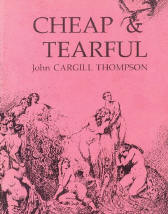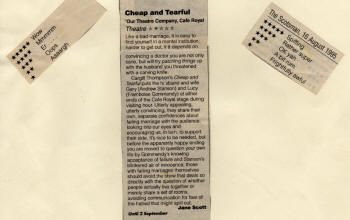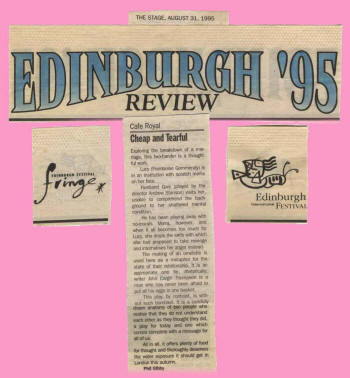CHEAP
& TEARFUL De John Carghill Thompson
Mis en Scène par Andy Stanson
Ma pièce préférée, pour laquelle j'ai obtenu 5 étoiles au Festival
d'Edinburgh - la plus haute récompense du Festival(je dis je, car c'était
pratiquement un monologue).
Une création (ma première) en Anglais, une pièce superbe, pleine d'humour,
de larmes, d'émotions, de rires, de sensualité.
J'adorerais la traduire et la jouer en français. |
 |
|
THE SCOTSMAN

Our'
Theatre Company, Cafe Royal
*****
(five stars you philistine, meaning the best of the best, can’t get
better!)
|
Like
a bad marriage, it is easy to find yourself in a mental institution; harder to
get out, if it depends on convincing a doctor you are not only sane, but will try
patching things up with the husband you threatened with a carving knife.
Cargill Thompson’s Cheap and Tearful puts the husband and wife Gary (Andrew Stanson) and Lucy (Framboise Gommendy) at either ends of the Café Royal stage
during visiting hour.
Utterly appealing. Utterly convincing, they share their own, separate
confidences about failing marriage with the audience, looking into our eyes and
encouraging, in turn, to support their side. It’s nice to be needed, but before
the apparently happy ending you are move to question your own life by Gommendy’s
knowing acceptance of failure and Stanson’s blinkered air of innocence; those
with failing marriage themselves should avoid the show that deals so directly
with the question of whether people actually live together or merely share a set
of rooms, avoiding communication for fear of the hatred that might spill out.

the Scotsman |
|
Exploring the breakdown of a marriage, this two-hander is a thoughtful work.
Lucy (Framboise Gommendy) is in an institution with scratch marks on her face.
Husband Gary (played by the director Andrew Stanson) visits her, unable to
comprehend the background to her shattered mental condition. He has been playing
away with no-morals Moira, however, and when it all becomes too much for Lucy,
she drops the knife with which she had proposed to take revenge and internalises
her anger instead.
The making of an omelette is used here as a metaphor for the state of their
relationship. It is an appropriate one for, rhetorically, writer John Cargill
Thompson is a man who has never been afraid to put all his eggs in one basket.
This play, by contrast, is without such bombast. It is a carefully drawn anatomy
of two people who realise that they do not understand each other as they thought
they did, a play for and one which comes complete with a message for all of us.
All in all, it offers plenty of food for thought and thoroughly deserves the
wider exposure it should get in London this autumn.

The Stage |
THE STAGE

|
|